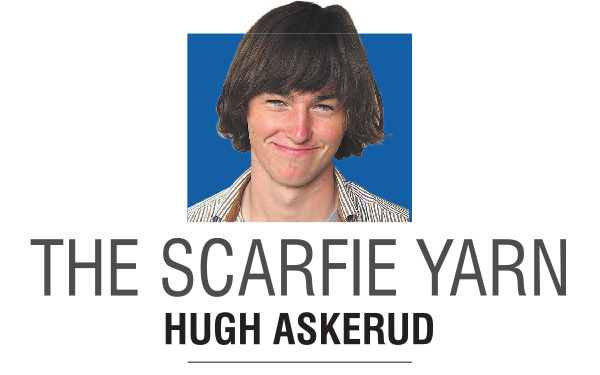
For me, the joy is in the writing itself, not the effect it has on people, if any, though I acknowledge that the reader is just as much a facet of the work as I am.
But, recently, my mind has been changed.

Though their cause is one which many New Zealanders empathise with, it’s a cause few would risk getting behind, and it’s one that, admittedly, made me realise how cowardly I have been in my own writing.
I write a column every two weeks in which I express a deeply held opinion I have, usually about student culture. These contain literally thousands of words pulled directly from my brain, yet the average reader, no matter how fastidiously they consume my yarns, wouldn’t have the foggiest about who I really am.
It’s not like I’m lying about anything I say, but how many of my opinions say anything about who I am? Or what motivates me? I have become, without even knowing it, someone who writes, gripping the pen in fear.
Such as that my immediate reaction to the academics’ stance was one of discomfort.
But why? Writing is the art of expressing oneself. Why should it be so unwieldy and defensive?
Should I, and the many other defensive writers who populate the world, open ourselves up?
The first thing that’s at stake is the obvious: if you take a stance on a matter bigger than yourself you risk shutting yourself off to people.
People take things seriously, and if you don’t consider that, you’re bound to be hamstrung.
Secondly, something which may not be of great external significance can be reinterpreted as an aspect of a larger narrative or a certain personality.
People immediately write you off if you have the gall to have an isolated opinion, one which may naturally lend itself to immediate conclusions about your character.
This effect is amplified when that’s the only news we get of that person — that’s how the brain works when it’s confronted with such limited information.
And this information gets around of course. Whether they are interested or not, people will hear about it, on their feeds, in the paper.
It’s a tremendous act of bravery to write with expression, without fear of the consequence. More broadly, these fears abound in other circumstances. There’s a reason students are tentative about protesting or having a big night out on Castle St.
In such a tight employment market for the students exiting university today, there’s the underlying assumption that employers will use anything against you, whether that be a video of you smashing your flatmate’s door or a video of you peacefully protesting against university staff cuts.
It’s a recipe for student apathy.
Writing’s similar.
If we fail to write about our values, if we fail to write the truth, do we in turn fail to act when it matters?
Reflecting on it myself, yes, I’ve failed to show up in circumstances where I have an opportunity for my voice to be heard.
Whether it’s a protest, a call for submissions, or even writing these columns, I write and act with fear. I’m not as angry as I once was, and that’s not necessarily something to boast about. My troubles are personal; sure, I’m aware that I am very privileged in my role as someone who gets to write, gets to communicate something quintessentially true(ish) about the world.
But other students are fighting this internal war with themselves, the thought of employers getting a hold of anything about them being a daunting prospect.
Every Monday I head out on to campus to interview students for their opinions on a certain issue for the student magazine Critic Te Arohi.
Last week, we had 17 rejections before one person put us out of our misery with an answer.
The question was "should we decriminalise all drugs?"
A tetchy question sure, but in the context of the actual debate on the subject, one with a few good answers.
Students are camera averse, largely out of fear that someone will see it later on down the track.
Our inability to escape surveillance has led us to actively escape environments in which we express our true thoughts.
It’s surely a poor indictment of the student body if our codgery old lecturers are protesting more than us.
There’s a lot to fear. We’ve all heard horror stories of people who have had their lives drop off a cliff after saying something stupid publicly.
But we have got to learn to speak our minds.
It is worth the risk for change.
- Hugh Askerud is a 20-year-old local and student at the University of Otago, majoring in politics and religious studies.












